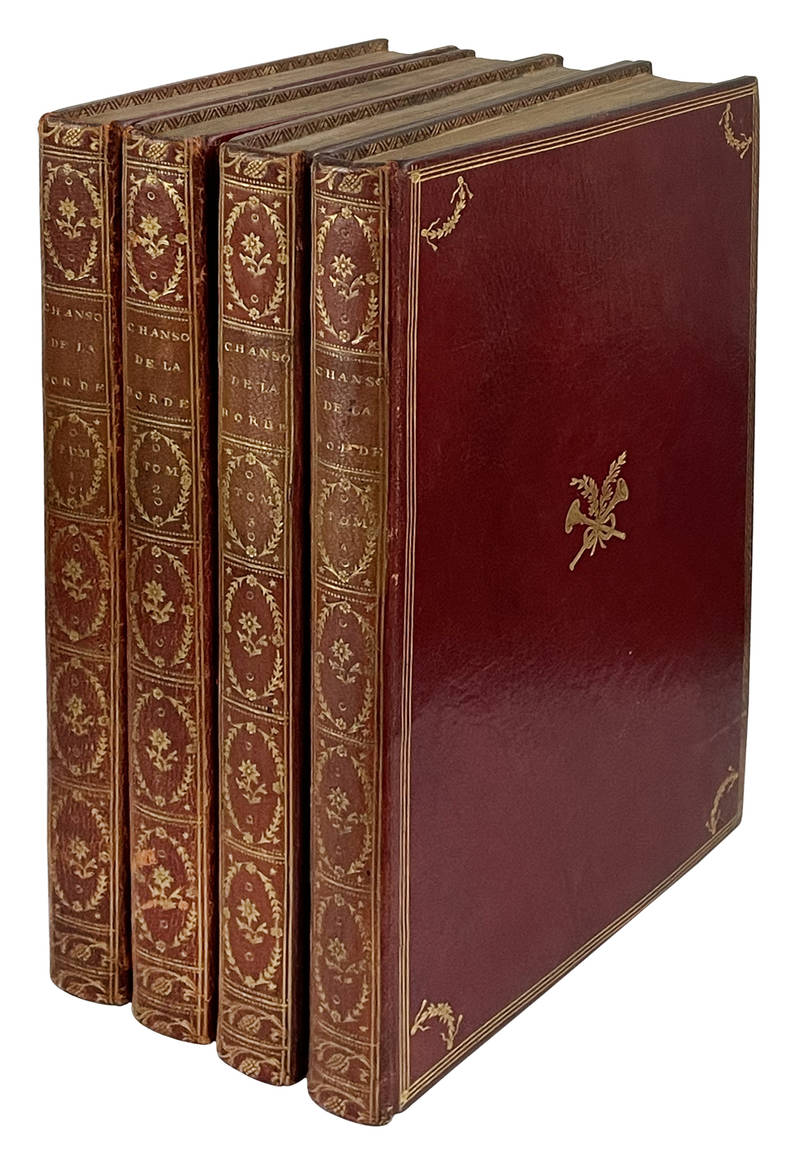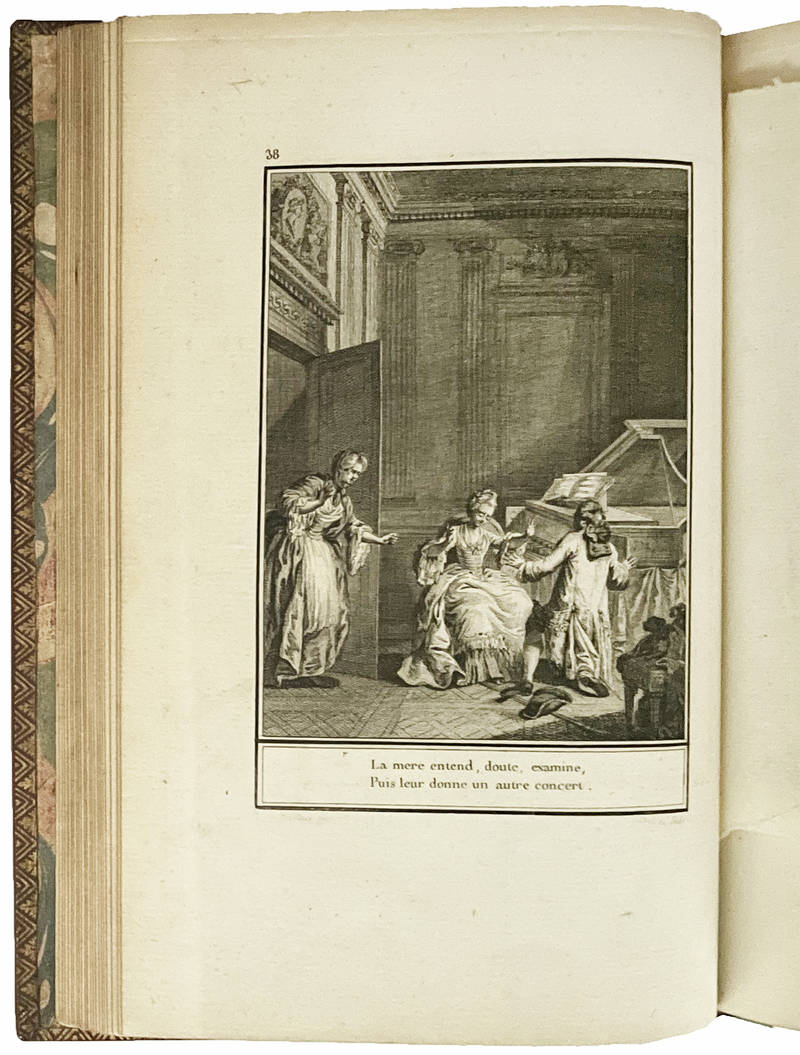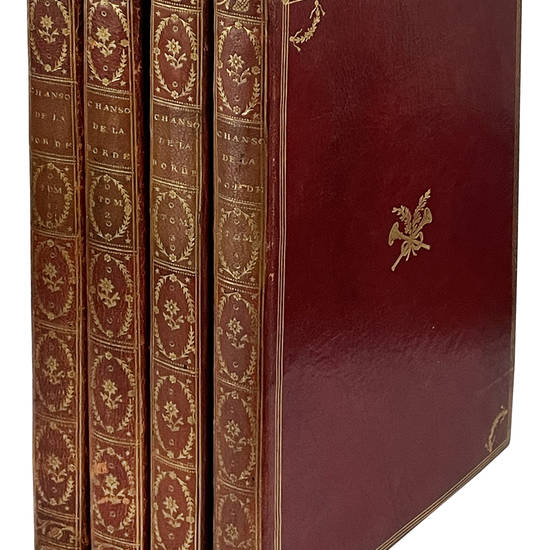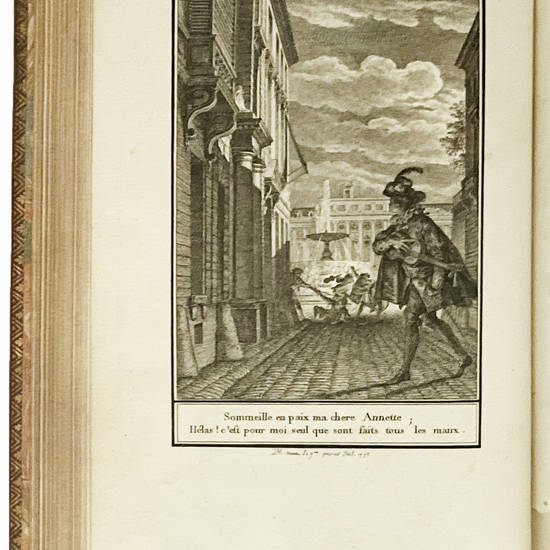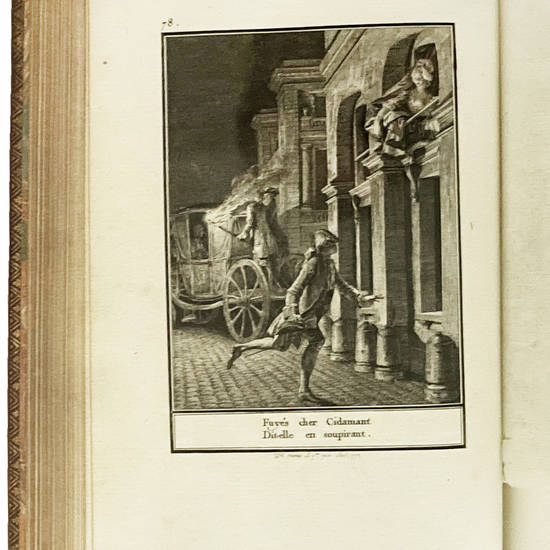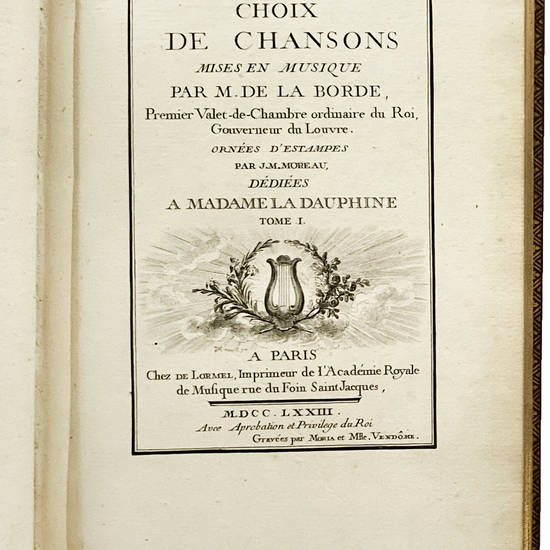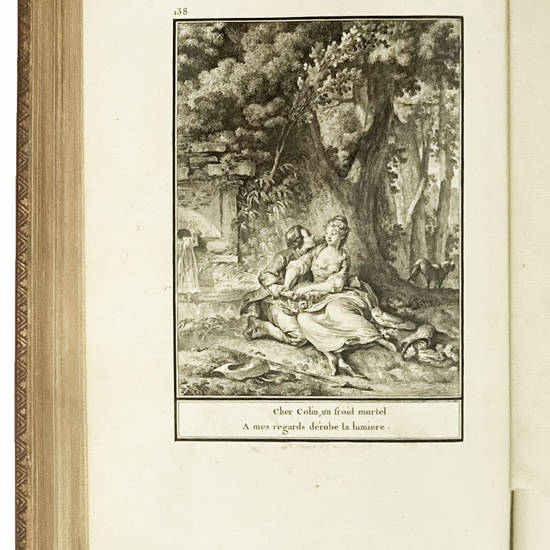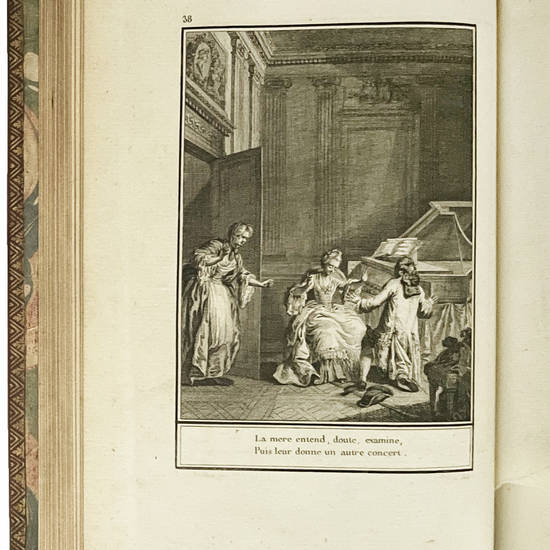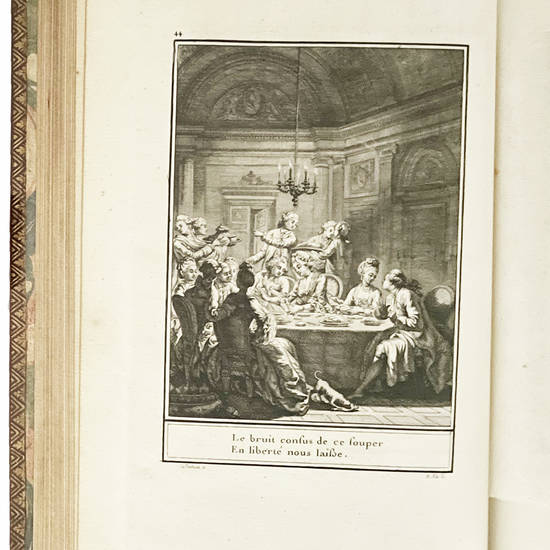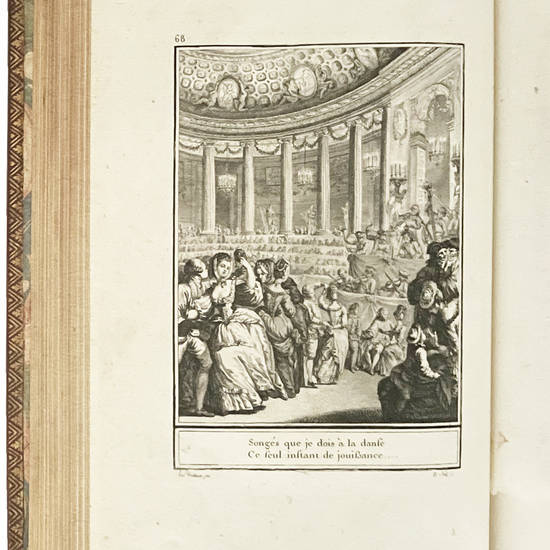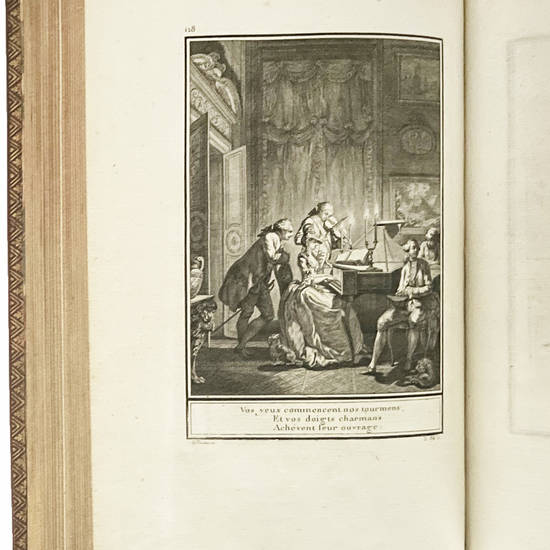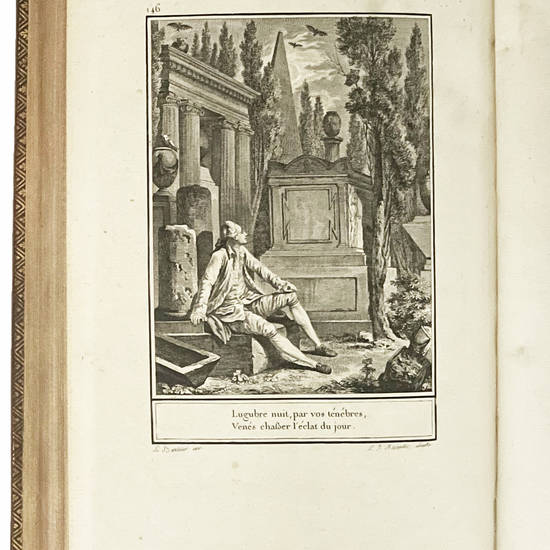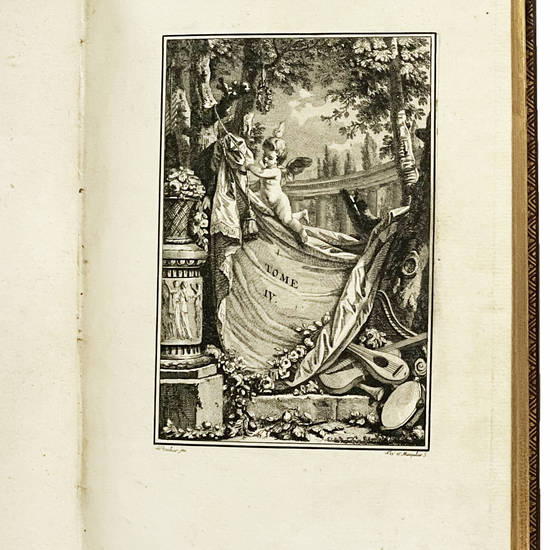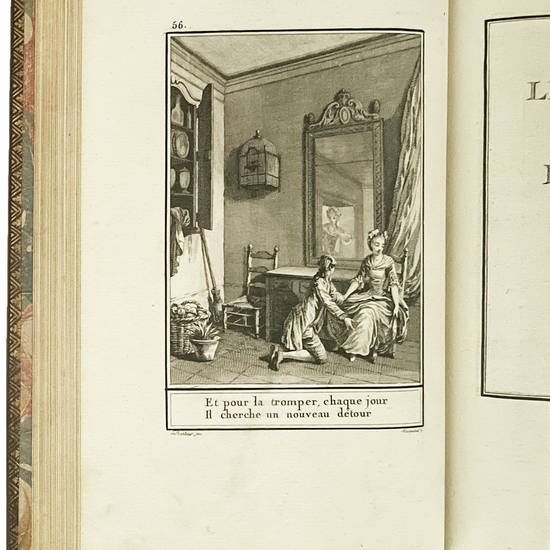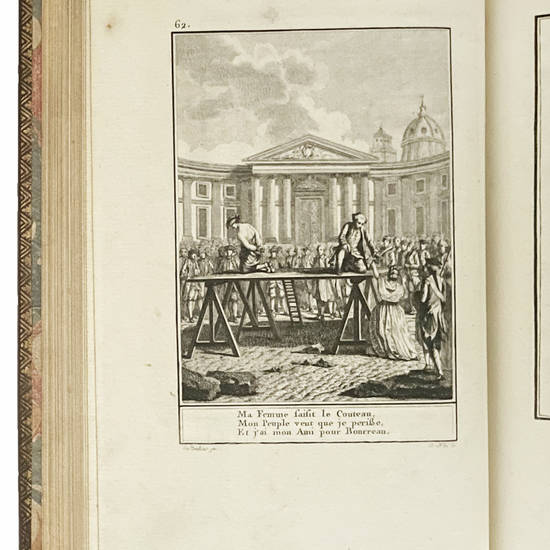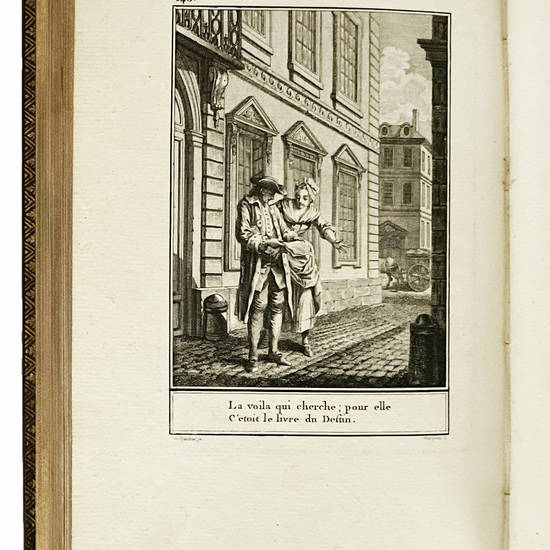Choix de chansons mises en musique par M. de la Borde, Premier Valet-de-Chambre du Roi, Gouverneur du Louvre. Ornées d'estampes par J.M. Moreau, dédiées à Madame la Dauphine
Autore: LABORDE, Benjamin de, comp. (1734-1794)-MOREAU, Jean-Michel, ill. (1741-1814)
Tipografo: Chez de Lormel, Imprimeur de l'Académie Royale de Musique rue du Foin Saint Jacques
Dati tipografici: Paris, 1773
Four volumes, 8vo (230x150 mm). 154, [4, of which the last is a blank]; [2], 153, [1 blank]; [2], 150, [4, of which the last is a blank]; [2], 150, [4, of which the last is a blank]. Fully engraved text and music by Moria and M.lle Vendôme. With engraved title page and engraved dedication bearing the dedicatee's arms in volume one, 3 engraved frontispieces by Le Bouteux and Le Barbier (one with the portrait of the Dauphine) for the remaining three volumes, and 100 full-page plates etched by Masquelier and Née after Moreau le Jeune, Le Barbier, Le Bouteux and Saint-Quentin. Original tissue guards mostly preserved. The portrait of Laborde, which can be found in some copies, is not part of this edition and was separately printed in 1774. Elegantly bound in contemporary wine-red morocco gilt, panels with central fleuron and corner-pieces within a triple fillets, richly gilt spine with lettering piece, inside dentelles and edges gilt, marbled endpapers, green silk bookmarks (minimal restorations to the top of the spine in two volumes and to the joints). Occasional light spotting on a few leaves. A very nice copy with wide margins in its original stylish binding.
First edition (first issue with a pencil correction of a verse on p. 54 of volume 2), dedicated to the Dauphine Marie Antoinette, of this masterpiece of French rococo art, which combines in a perfect way contemporary poetry, contemporary music for voice and harp or harpsichord, and over a hundred plates illustrating the text. The work is thus quite emblematic of late 18th-century prerevolutionary France with its exaltation of courtly life and enlightened ideas of the philosophes.
Laborde was born into a wealthy aristocratic family. His father was the banker Jean-François de Laborde. Although destined to a career in finance, he received a wide education which included music. As a teenager Laborde was privileged to study with some of the best musicians of the day, namely violin with Antoine Dauvergne and composition with Jean Phillipe Rameau, whose theoretical works had a great influence on him. In 1748, at the age of fourteen, he presented at Mons his first composition, an opera called La chercheuse d'oiseaux. In 1762 Laborde formally entered the service of the king as ‘premier valet de chambre' and became a close and loyal confidant of the dauphin. Later on Louis XV appointed him fermier-général, a sort of farm tax collector. The king also supported Laborde's musical aspirations and for the next twelve years, until Louis XV's death in 1774, Laborde staged his works, mostly ‘opéras comiques', at all of the major Parisian musical institutions as well as in private performances for the court. Louis XVI was less supportive of his music, so after the latter's ascent to the throne Laborde's presence on the main stages actually disappeared. Laborde was very friendly with Voltaire, and they appear to have become acquainted with each other when Laborde composed incidental music for Voltaire's Pandore in 1767. Laborde was also very close to Madame du Barry. After Louis XV's death Laborde left Versailles for Paris and, around this time, married Adélaïde-Suzanne de Vismes (1753-1832), a distinguished poet and later ‘dame de lit' to Queen Marie-Antoinette. Despite his dedication to Marie Antoinette in 1773 of the luxurious set of illustrated ‘chansons' here offered, Laborde's influence at court dissipated. In Paris, from 1774 to 1794, he wrote, translated, edited, and collaborated on about twenty different books on music, topography, history, and literature. His most famous theoretical monograph on music is the Essai sur la musique ancienne et moderne (1780). In the quarrel that characterised the musical discourse in Paris at the time, Laborde took Rameau's side against Rousseau, and favoured Piccinni over Gluck. As a member of the aristocracy and also as a fermier-général Laborde was considered an enemy of the newly installed French republic. Arrested at Rouen, where he had fled to from Paris, he was summarily sentenced to death by guillotine and executed on 22 July 1794 (cf. M. Couty, Jean-Benjamin de Laborde ou Le bonheur d'être fermier-général, Paris, 2001; see also M. Fend, La Borde, Jean-Benjamin(-François) de, in: “Grove Music Online. 2001”).
Cohen-de Ricci, 534-538; Fürstenberg, 46.
[11928]

